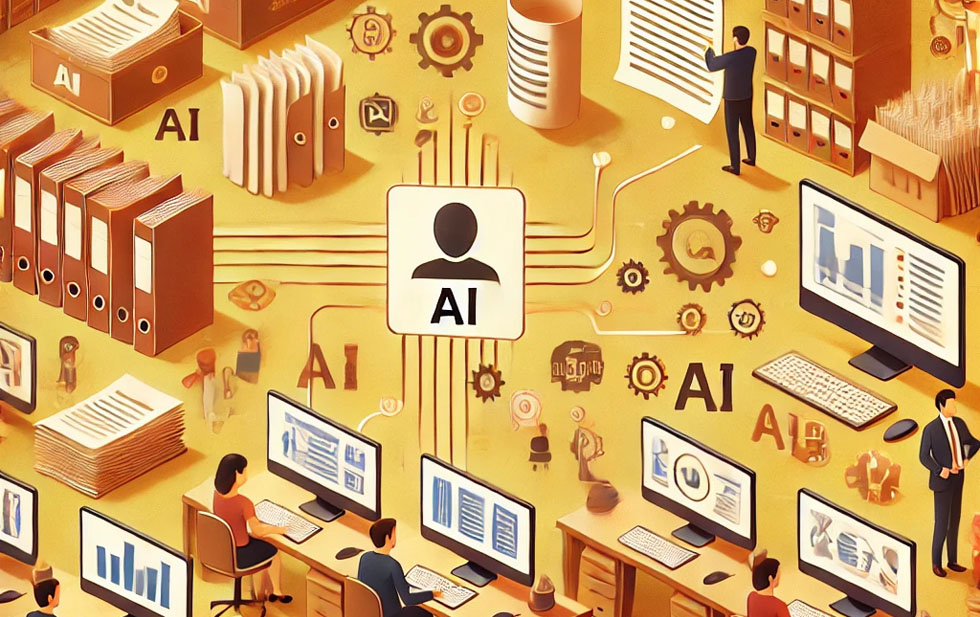The Frontier of AI in Public Document Management - Automation Beyond Routine
The Frontier of AI in Public Document Management - Automation Beyond Routine
In the landscape of automated solutions, a quiet transformation is underway in how public documents are processed and managed.
16 August 2024
BACK TO BLOGS

Introduction
Artificial Intelligence's role is rapidly evolving from back-office automation to sophisticated analytical platforms capable of strategic document handling and decision-making. This progression not only streamlines processing but also anticipates future social and economic contributions.
The application of Artificial Intelligence (AI) in public document management is transcending traditional boundaries. Initial automation efforts focused on improving efficiency and reducing workload have shifted toward leveraging AI for more complex, decision-oriented tasks.
Today's AI systems are increasingly capable of undertaking substantial analytical roles, potentially reshaping public administration.
What's Changing?
Recent advancements in generative AI and machine learning are embedding deeper intelligence into automated systems used for public document handling. Traditional systems prioritized error reduction and speed, but new AI-driven systems, as seen with the initiatives by the USPTO and others, aim to blend these tasks with more nuanced, strategic decision-making capabilities (Federal Register, 11 April 2024). From automated processing to intelligent analysis, AI is poised to handle a broader spectrum of tasks, which includes risk assessment, predictive analysis, and ultimately, the ability to formulate policy recommendations based on data trends (TechRepublic, 16 November 2023).
Why is this Important?
The importance of embracing advanced AI in document management extends beyond mere efficiency. For government agencies, the potential to process documents with AI-driven insights means faster response times to public needs, improved accuracy in public service, and a significant reduction in bureaucratic lag. Furthermore, such capabilities allow for a better foresight in policy-making and public spending, aligning closely with public expectations and accountability demands (UKAuthority, 20 March 2024).
Implications
The implications of AI in public document management are profound. Governments could deploy AI to not only handle increasing volumes of data but also to derive comprehensive insights that inform more effective governance strategies. On a broader scale, by automating complex decision-making processes, AI could reduce the cost of governance, thereby reallocating resources to critical areas such as healthcare, education, and public safety (Tech Xplore, 1 February 2024). The strategic use of AI in managing public documents might also lead to more transparent government operations, fostering greater trust and engagement with citizens.
Questions
-
How will public sectors ensure the ethical use of AI in document management without compromising citizen privacy?
-
What steps should governments take to integrate AI technologies seamlessly and sustainably into existing public document management systems?
-
How will the role of human workers evolve as AI takes on more complex document handling tasks?
Keywords
Generative AI; Predictive Analysis; Public Document Management; AI Ethics
Bibliography
Stay Curious,
Matthew, CEO
Shaping Tomorrow
Mini Series: How AI may create new opportunities for Public Services!
Public Services are at the brink of the most important improvement for decades. By rethinking what is possible and incorporating AI assistance to achieve significant better results for citizens the world over.
Automating welfare eligibility screening isn't just about cutting costs—it's becoming a crucial strategy that involves a blend of technology, policy, and societal values. Today's Quick Take exposes a trend in automated welfare determinations that could, given the trajectory of technological adoption and regulatory landscapes, ripple through social systems globally - Check our Quick Take for the the full insight ...
Shaping Tomorrow is all about our Future
- Horizon Scanning
- Options Analysis
- Trends and Weak Signals
- Structured Overviews, Quick Takes, Graphics and Reports
